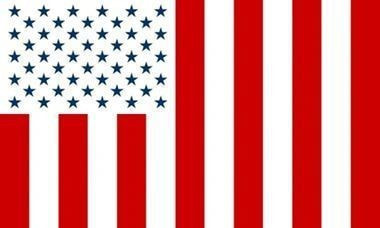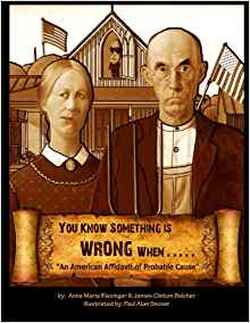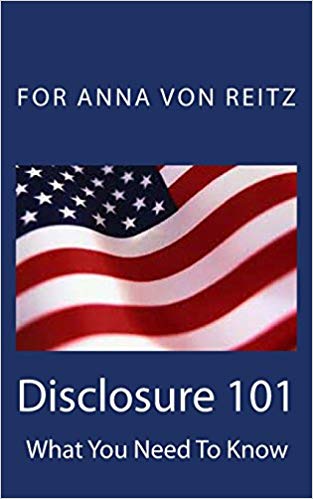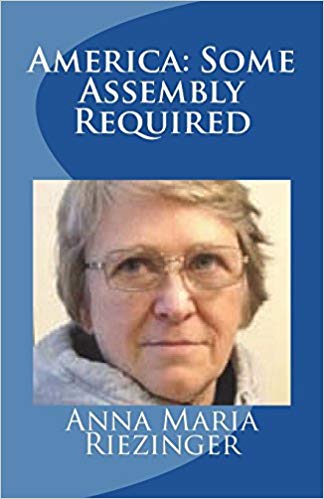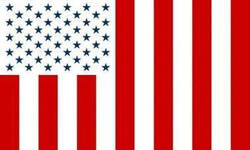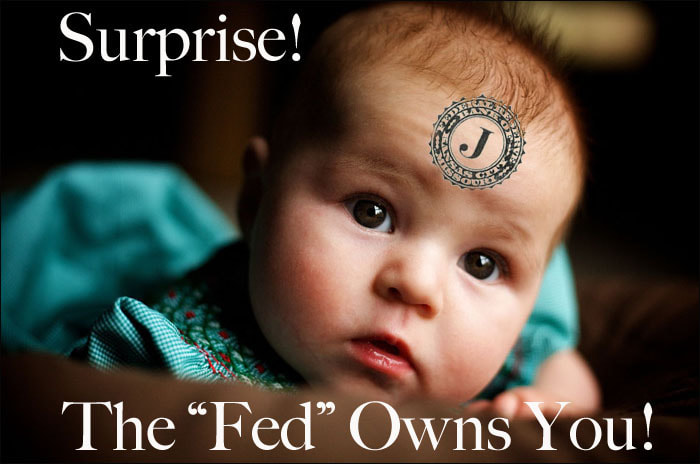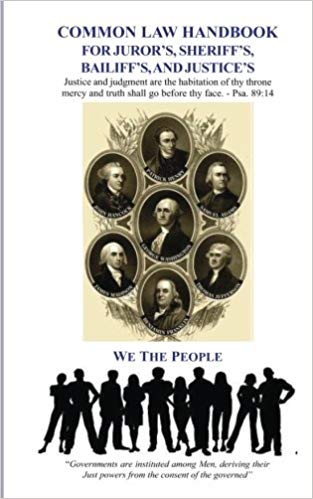|
By Anna Von Reitz
My comments in reply to this latest "close but no banana" analysis of historical documents are shown in slightly larger bold print. This is what happens when people either do not know "the Code" or choose not to. Either way, the result is the same. We miss the Truth. It is interesting to note that the interpretation Mr. Montgomery gives to this argument which is basically in support of the King's claim to the [Territorial] United States which was never at issue, is precisely the same argument that understands our claims in the same regard ---- land held in trust like assets possessed by pirates --- does not change ownership. by homelessholocaust A KING’S CHARTER THAT REFUSES TO DIE JULY 20, 1998 by James Montgomery https://www.youtube.com/watch?v=v7W_UFU271E http://www.biblebelievers.org.au/king35.htm I would like to start by thanking Pete Stern and The Informer for their continued research and dedication to the American people. Pete deserves special thanks for finding an annotated copy of the Definitive 1783 Treaty of Peace,The Society wherein he found reference to the Supreme Court case, for Propagating the Gospel &c v. New Haven,quote from the 8 Wheat. 464; 5 Cond. Rep. 489. I will this case and the Chamberlin case below. The Newhaven case is a true God-send, it thoroughly confirms The Informer’s research and my own findings that we are subjects bearing financial obligation for the debt owed to the king of England and his heirs and successors, as well as the main party of interest, the Pope. Which confirms what I said in the following quotes from “The United States Is Still A British Colony”:- “YIELDlNG AND PAYING yearly, to us, our heirs and Successors, for the same, the yearly Rent of Twenty Marks of Lawful money of England, at the Feast of All Saints, yearly, forever, The First payment thereof to begin and be made on the Feast of All Saints which shall be in the year of Our Lord One thousand six hundred Sixty and five; AND also, the fourth part of all Gold and Silver Ore which, with the limits aforesaid, shall, from time to time, happen to be found.” (The Feast of All Saints was celebrated on November 1 each year.) The Carolina Charter, 1663. “And provided further, that nothing herein contained shall affect the titles or possessions of individuals holding or claiming under the laws heretofore in force, or grants heretofore made by the late King George II, or his predecessors, or the late lords proprietors, or any of them.” Declaration of Rights 1776, North Carolina Constitution. http://www.nhinet.org/ccs/docs/nc-1776.htm I have been declaring this in spite of being slammed by pro-Constitutionalist patriots, who refuse to accept the facts. The king is still head of America Inc., the author of its Charters, and the creator of his cestui que trust. The king continues to be the benefactor along with his heirs and successors of the largest corporation in the history of the world. The Pope as well is co-benefactor with the king, thanks to the king’s concessions of May 15, 1213 to the Pope. “We wish it to be known to all of you, through this our charter, furnished with our seal, that inasmuch as we had offended in many ways God and our mother the holy church, and in consequence are known to have very much needed the divine mercy, and can not offer anything worthy for making due satisfaction to God and to the church unless we humiliate ourselves and our kingdoms: we, wishing to humiliate ourselves for Him who humiliated Himself for us unto death, the grace of the Holy Spirit inspiring, not induced by force or compelled by fear, but of our own good and spontaneous will and by the common counsel of our barons, do offer and freely concede to God and His holy apostles Peter and Paul and to our mother the holy Roman church, and to our lord pope Innocent and to his Catholic successors, the whole kingdom of England and the whole kingdom Ireland, with all their rights and appurtenances, for the remission of our own sins and of those of our whole race as well for the living as for the dead; and now receiving and holding them, as it were a vassal, from God and the Roman church, in the presence of that prudent man Pandulph, subdeacon and of the household of the lord pope, we perform and swear fealty for them to him our aforesaid lord pope Innocent, and his catholic successors and the Roman church, according to the form appended; and in the presence of the lord pope, if we shall be able to come before him, we shall do liege homage to him; binding our successors aid our heirs by our wife forever, in similar manner to perform fealty and show homage to him who shall be chief pontiff at that time, and to the Roman church without demur.” Concessions of May 15, 1213 to the Pope. The States and it’s inhabitants claim this land as theirs, patriots claim they have allodial title to the land. How can this be when they never owned it to begin with? “But this State had no title to the territory prior to the title of the King of Great Britain and his subjects, nor did it ever claim as lord paramount to them. This State was not the original grantor to them, nor did they ever hold by any kind of tenure under the State, or owe it any allegiance or other duties to which an escheat is annexed. How then can it be said that the lands in this case naturally result back by a kind of reversion to this State, to a source from whence it never issued, and from tenants who never held under it?” MARSHALL v. LOVELESS, 1 N.C. 412 (1801), 2 S.A. 70. The world continues to pay the benefactors of the king’s Charters, for the king’s investment in America, via taxes. I have got news for you America, if Conquest, war or the dividing of an Empire cannot pry the possessions from a Corporate trust, the king never lost or was in danger of losing his possessions. Also, the king’s money that was in existence and being used by the states and their inhabitants, prior to the Revolutionary War, remained the king’s possessions, real property, on loan to America and her inhabitants, for which the king expected and demanded his return for his investment, under his corporate Charters and the trust he set up for his heirs and successors. Was this the only infusion of money into this Country? No. Beginning in 1778, just two years after the Revolutionary War began, the states were borrowing money from the king of France. The House of Rothschilds located in France was the money source. France (Rothschilds) continued to loan money to the U.S. government with the debt reaching 18 million dollars. This is the foothold Hamilton had over Washington during the debate on whether or not to allow the banking families to incorporate in the U.S., and float this country’s debt. You don’t have to be a rocket scientist to figure it out, look back at what has happened since, and you will see this is in fact what took place. Seems to me as a matter of law, a contract entered into voluntarily by someone voids any conflict or injury to that individual’s rights. The king always intended to retain his minerals and money, and he knew (as stated by other quotes in this article) that the barristers would retain his land under the corporate trust. Contract Between the King and the Thirteen United States of North America, signed at Versailles July 16, 1782:- ARTICLE 1 “It is agreed and certified that the sums advanced by His Majesty to the Congress of the United States under the title of a loan, in the years 1778, 1779, 1780, 1781, and the present 1782, amount to the sum of eighteen million of livres, money of France, according to the following twenty-one receipts of the above-mentioned underwritten Minister of Congress, given in virtue of his full powers, to wit: 1. 28 February 1778 750,000 2. 19 May do 750,000 3. 3 August do 750,000 4. 1 November do 750,000 Total 3,000,000 5. 10 June 1779 250,000 6. 16 September do 250,000 7. 4 October do 250,000 8. 21 December do 250,000 Total 1,000,000 9. 29 February 1780 750,000 10. 23 May do 750,000 11. 21 June do 750,000 12. 5 October do 750,000 13. 27 November do 1,000,000 Total 4,000,000 14. 15 February 1781 750,000 15. 15 May do 750,000 16. 15 August do 750,000 17. 1 August do 1,000,000 18. 15 November do 750,000 Total 4,000,000 19. 10 April 1782 1,500,000 20. 1 July do 1,500,000 21. 5 of the same month 3,000,000 Total 6,000,000 Amounting in the whole to eighteen millions, viz 18, 000, 000. By which receipts the said Minister has promised, in the name of Congress and in behalf of the thirteen United States, to cause to be paid and reimbursed to the royal treasury of His Majesty, on the 1st of January, 1788, at the house of his Grand Banker at Paris, the said sum of eighteen millions, money of France, with interest at five per cent per annum.” Source: Treaties and Other International Acts of the United States of America. Edited by Hunter Miller Volume 2 Documents 1-40 : 1776-1818 Washington: Government Printing Office, 1931. Notice also folks, this is just one year before the 1783 Treaty of Peace is signed, the king of France (Rothschilds) made sure his debt was protected before he signed on to the con of the millennium. The king of England’s Charter on one side, the Rothschild’s debt obligations on the other, both vying for a piece of America. The king of England for his trust, the Rothschilds for their corporate take-over and control of the king’s trust, the Pope as the main benefactor of both sides. The Pope remains even further in the background than the Rothschilds, however he stands to gain no matter what happens. Here are a few quotes from William Manley German, in a speech to the House of Commons December 1913. “….Referring to Canada’s bank acts: I believe the plan outlined follows the English system, a system applied to the great banks of England. Mr. White, House of Commons, December 17, 1912, in response to a question from the Honorable William Manley German. i.e. they were creating an English system which is to say a Rothschildian cartel….” “Senator Robert L. Owen continues: “It was not very long until this information was brought to the Rothschild’s Bank, and they saw that here was a nation ready to be exploited; here was a nation setting up an example that they could issue their own money instead of the money coming through the banks.” “The Rothschild’s Bank caused a bill to be introduced in the English Parliament, which provided that no colony of England could issue its own money.” “Thus, they had to use English money. The colonies were compelled to discard their money and mortgage themselves to the Rothchild’s Bank of England to get money.” “Then, for the first time in the history of the United States, money began to be based on debt. Benjamin Franklin stated that in one year from that date the streets of the colonies were filled with the unemployed.” “Franklin later claimed that this was the real cause of the War of Independence. He said: “The colonies would gladly have borne the little tax on tea and other matters had it not been that England and the Rothschild’s Bank took away from the colonies their money which created unemployment, dissatisfaction and debt.” William Manley German, in a speech to the House of Commons December 1913, Brigham Young University, web site Http://library.byu.edu/~rdh/eurodocs/uk.html. Nothing changes, the Rothschilds have always played both sides against each other, they did the same thing during the Civil War, see my research paper, “A Country Defeated In Victory, parts I & II.” Before I go any further lets look at the facts that prove the king never lost his Corporations created by his Charters, or lands held by his Corporations, by and through the supposed loss of the Revolutionary War, or the signing of the 1783 Treaty of Peace, or the 1794 Jay Treaty. “The property of British corporations, in this country, is protected by the sixth article of the Treaty of Peace of 1783, in the same manner as those of natural persons; and their title, thus protected, it confirmed by the ninth article of the Treaty of 1794, so that is could not be forfeited by any intermediate legislative act, or other proceeding for the defect of alienage.” The Society for Propagating the Gospel, &c v. New Haven, 8 Wheat. 464; 5 Cond. Rep. 489. (Footnote-annotated, Definitive Treaty of Peace). “The capacity of private individuals (British subjects), or of corporations, created by the crown, in this country, or in Great Britain, to hold lands or other property in this country, WAS NOT affected by the revolution. The proper courts in this country will interfere to prevent an abuse of the trusts confided to British corporations holding lands here to charitable uses, and will aid in enforcing the due execution of the trusts; but neither those courts, nor the local legislature where the lands lie, can adjudge a forfeiture of the franchises of the foreign corporation, or of its property. The property of British corporations, in this country, is protected by the 6th article of the Treaty of Peace of 1783 in the same manner as those of natural persona; and their title, thus protected, is confirmed by the 9th article of the Treaty of 1794, so that it could not be forfeited by any intermediate legislative act, or other proceeding, for the defect of alienage. The termination of a treaty, by war, DOES NOT divest rights of property already vested under it. Nor do treaties, in general, become extinguished, ipso facto, by war between the two governments. Those stipulating for a permanent arrangement of territorial, and other national rights, are, at most, suspended during the war, and revive at the peace, unless they are waived by the parties, or new and repugnant stipulations are made.” The Society, &c., v. The Town of New Haven. Et Al. 8 Wheat. 464; 5 Cond. Rep. 489. The king holds the rest of the world to different standards, as does the Pope. He holds us to the king’s law on trusts and does not apply the same law to himself, so he can retain his lands and possessions, as does the Pope, under British-made International law. “It is a familiar principle that the King is not bound by any act of parliament unless he be named therein by special and particular words. The most general words that can be devised (for example, any person or persons, bodies politic or corporate) affect not him in the least, if they may tend to restrain or diminish any of his rights and interests. He may even take the benefit of any particular act, though not named. The rule thus settled respecting the British Crown is equally applicable to this government, and it has been applied frequently in the different states, and practically in the Federal courts. It may be considered as settled that so much of the royal prerogatives as belonged to the King in his capacity of parens patrioe, or universal trustee, enters as much into our political state as it does into the principles of the British Constitution.” U.S. v. Chamberlin, 219 U.S. 250 (1911), “Dollar Sav. Bank v. United States, supra”. Do the king and the Pope have proper claims to their land holdings? No. The king’s claim would not exist accept for his barristers (lawyers), his backers, the bankers, the Pope, via his churches’ land holdings and financial backing of the early banking families. The reason I also say no, is fraud and deception are involved. How did the king come by his claim? By the Conquest of Britain by William the Conqueror in 1066, and thanks to the Pope’s partnership with England, as trustee for Rome, working inside of Britain with her Jesuit priests. Conquest does not change land held in trust. So the lands held by the Brits and trusts (wills of testament), and traditions of the father’s land going to the sons, could not be overturned by the Conquest of William the Conqueror. But even further than that, God Almighty granted to Adam and his descendants the entire earth, it was given away to Satan, but later reclaimed by Jesus Christ as the second Adam. Just as the king held on to his possessions after the Revolutionary War for his heirs and successors, and just as conquest does not change ownership of lands and possessions held in trust. The fraud is, the king is taxing us for a trust he created, based on an earlier conquest. “As further evidence, not that any is needed, a percentage of taxes that are paid are to enrich the king/queen of England. For those that study Title 26 you will recognize IMF, which means Individual Master File; all tax payers have one. To read one you have to be able to break their codes using file 6209, which is about 467 pages. On your IMF you will find a blocking series, which tells you what type of tax you are paying. You will probably find a 300-399 blocking series, which 6209 says is reserved. You then look up the BMF 300-399, which is the Business Master File in 6209. You would have seen prior to 1991, this was U.S.-U.K. Tax Claims, non-refile DLN. Meaning everyone is considered a business and involved in commerce and you are being held liable for a tax via a treaty between the U.S. and the U.K., payable to the U.K.. The form that is supposed to be used for this is form 8288, FIRPTA – Foreign Investment Real Property Tax Account, you won’t find many people using this form, just the 1040 form. The 8288 form can be found in the Law Enforcement Manual of the IRS, chapter 3. If you will check the Office of Management and Budget’s (OMB) paper, in the Department of Treasury, List of Active Information Collections, Approved Under Paperwork Reduction Act, you will find this form under OMB number 1545-0902, which says U.S. withholding tax-return for dispositions by foreign persons of U.S. real property interests-statement of withholding on dispositions, by foreign persons, of U.S. Form #8288 #8288a These codes have since been changed to read as follows; IMF 300-309, Barred Assessment, CP 55 generated valid for MFT-30, which is the code for 1040 form. IMF 310-399 reserved, the BMF 300-309 reads the same as IMF 300-309. BMF 390-399 reads U.S./U.K. Tax Treaty Claims. The long and short of it is nothing changed, the government just made it plainer, the 1040 is the payment of a foreign tax to the king/queen of England. We have been in financial servitude since the Treaty of 1783.” The United States Is Still A British Colony, part I. It’s a big con. Only God Almighty owns the land, by grant and charter, also trust, the land is reserved for us and our use. How can you take that which does not belong to you? It is a shame we could not have learned from the American Indian, that no man owns the land. “….In Harden v Fisher, 1 Wheat Rep. 300, which was also under the Treaty of 1794, this court held that it was not necessary for the party to show a seisin in fact, or actual possession of the land, but only that the title was in him, or his ancestors, at the time the treaty was made….” The Society, &c., v. The Town of New Haven. Et Al. 8 Wheat. 464; 5 Cond. Rep. 489. “….In Terrett v. Taylor, it was stated that the dissolution of the regal government, no more destroyed the rights of the church to possess and enjoy the property which belonged to it, than it did the right of any other corporation or individual to his or its own property. In the later case, the Chief Justice, in reference to the corporation of the college, observes that it is too clear to require the support of argument, that all contracts and rights respecting property remained unchanged by the revolution; and the same sentiment was enforce, more at length, by the other judge who noticed this point in the cause….” The Society, &c., v. The Town of New Haven. Et Al. 8 Wheat. 464; 5 Cond. Rep. 489. As a matter of law these treaties were written in such away they could not be overturned using civil law, so the Revolutionary War changed nothing concerning the king’s investment and creation of America Inc. “….His lordship observes that that was a case in which the old government existed under the King’s charter, and a revolution took place, though the new government was acknowledged by this country. Yet it was held, that the property, which belonged to a corporation existing under the King’s charter, was not transferred to a body which did not exist under his authority, and, therefore, the fund in this country was considered to be bona vacantia belonging to the crown….” The Society, &c., v. The Town of New Haven. Et Al. 8 Wheat. 464; 5 Cond. Rep. 489. “….The treaty of 1783 forbids all forfeitures on either side. That of 1794 provides that the citizens and subjects of both nations, holding lands (thereby strongly implying that there were no forfeitures by the revolution), shall continue to hold, according to the tenure of their estates; that they may sell and devise them; and shall not, so far as respects these lands and the legal remedies to obtain them, be considered as aliens. In the case Kelly v. Harrison, 2 Johns. cas 29., Mr. Chief Justice Kent says:” I admit the doctrine to be sound (Calvin’s case, 7 Co. 27 b.; Kirby’s Rep. 413), that the division of an empire works no forfeiture of a right previously acquired. The revolution left the demandant where she was before….” The Society, &c., v. The Town of New Haven. Et Al. 8 Wheat. 464; 5 Cond. Rep. 489. I remind America what Edmond Burke said: “….Let the colonies always keep the idea of their civil rights associated with your government — they will cling and grapple to you, and no force under heaven will be of power to tear them from their allegiance. But let it be once understood that your government may be one thing and their privileges another, that these two things may exist without any mutual relation — the cement is gone, the cohesion is loosened, and everything hastens to decay and dissolution. As long as you have the wisdom to keep the sovereign authority of this country as the sanctuary of liberty, the sacred temple consecrated to our common faith, wherever the chosen race and sons of England worship freedom, they will turn their faces towards you. The more they multiply, the more friends you will have, the more ardently they love liberty, the more perfect will be their obedience. Slavery they can have they may have it from Spain, they may have it from Prussia. But until you become lost to all feeling of your true interest and your natural dignity, freedom they can have from none but you. This commodity of price, of which you have the monopoly. This is the true Act of Navigation, which binds to you the commerce of the colonies, and through them secures to you the wealth of the world. Deny them this participation of freedom, and you break that sole bond which originally made, and must still preserve, the unity of the empire. . . Let us get an American revenue as we have got an American empire. English privileges have made it all that it is; English privileges alone will make it all it can be.” Edmund Burke, speech on conciliation with America, pages 71-72, March 22, 1775, web site, wysiwyg://54/http://odur.let.rug.nl/%7Eusa/D/1751- 1775/libertydebate/burk.htm. America what about that? “You have been conned” do you not understand? What will it take for you to wake up? king35.htm James Montgomery ========================================== http://www.atgpress.com/kifap/ans/a24.htm I’ve been seeing several emails concerning my book on “The United States Is Still A British Colony”. The main problem I have noticed is, it is obvious most of those in disagreement have not read the book, so they have responded based on preconceived ideas. I know now days we all have limited time to study any subject, much less one that appears to be so far removed from our present day situations. So most will not spend the time read all the information, because you don’t see the relevance. So in order, to cut though time of research; unless you find yourself seeing the relevance this subject makes to you and your family today, I have pulled just a few quotes out of my book, that will only take a minute for you to read. I chose these quotes based on the two main issues I see raised in disregard of the subject matter in question; one the 1783 Treaty of Paris, where a number of people say the Treaty proves they need not look any further; two, the understanding of taxation, and from whence it came. The below quotes are just a precursor of the facts in my book, I provide them to challenge preconceived ideas, of those that refuse to study the facts, or just don’t have time. “But this State had no title to the territory prior to the title of the King of Great Britain and his subjects, nor did it ever claim as lord paramount to them. This State was not the original grantor to them, nor did they ever hold by any kind of tenure under the State, or owe it any allegiance or other duties to which an escheat is annexed. How then can it be said that the lands in this case naturally result back by a kind of reversion to this State, to a source from whence it never issued, and from tenants who never held under it? MARSHALL v. LOVELESS, 1 N.C. 412 (1801), 2 S.A. 70 “The property of British corporations, in this country, is protected by the sixth article of the treaty of peace of 1783, in the same manner as those of natural persons; and their title, thus protected, it confirmed by the ninth article of the treaty of 1794, so that is could not be forfeited by any intermediate legislative act, or other proceeding for the defect of alienage.” The Society for Propagating the Gospel, &c v. New Haven, 8 Wheat. 464; 5 Cond. Rep. 489. (Footnote-annotated, Definitive Treaty of Peace) Article 6: Treaty of Paris of 1783 That there shall be no future confiscations made nor any prosecutions commenced against any person or persons for, or by reason of, the part which he or they may have taken in the present war, and that no person shall on that account suffer any future loss or damage, either in his person, liberty, or property; and that those who may be in confinement on such charges at the time of the ratification of the treaty in America shall be immediately set at liberty, and the prosecutions so commenced be discontinued. “The capacity of private individuals (British subjects), or of corporations, created by the crown, in this country, or in Great Britain, to hold lands or other property in this country, WAS NOT affected by the revolution. The proper courts in this country will-interfere to prevent an abuse of the trusts confided to British corporations holding lands here to charitable uses, and will aid in enforcing the due execution of the trusts; but neither those courts, nor the local legislature where the lands lie, can adjudge a forfeiture of the franchises of the foreign corporation, or of its property. The property of British corporations, in this country, is protected by the 6th article of the treaty of peace of 1783 in the same manner as those of natural persona; and their title, thus protected, is confirmed by the 9th article of the treaty of 1794, so that it could not be forfeited by any intermediate legislative act, or other proceeding, for the defect of alienage. The termination of a treaty, by war, DOES NOT divest rights of property already vested under it. Nor do treaties, in general, become extinguished, ipso facto, by war between the two governments. Those stipulating for a permanent arrangement of territorial, and other national rights, are, at most, suspended during the war, and revive at the peace, unless they are waived by the parties, or new and repugnant stipulations are made.” The Society, &c., v. The Town of New Haven. Et Al. 8 Wheat. 464; 5 Cond. Rep. 489. “It is a familiar principle that the King is not bound by any act of parliament unless he be named therein by special and particular words. The most general words that can be devised (for example, any person or persons, bodies politic or corporate) affect not him in the least, if they may tend to restrain or diminish any of his rights and interests. He may even take the benefit of any particular act, though not named. The rule thus settled respecting the British Crown is equally applicable to this government, and it has been applied frequently in the different states, and practically in the Federal courts. It may be considered as settled that so much of the royal prerogatives as belonged to the King in his capacity of parens patrioe, or universal trustee, enters as much into our political state as it does into the principles of the British Constitution.” U.S. v. Chamberlin, 219 U.S. 250 (1911), “Dollar Sav. Bank v. United States, supra” “….In Terrett v. Taylor, it was stated that the dissolution of the regal government, no more destroyed the rights of the church to possess and enjoy the property which belonged to it, than it did the right of any other corporation or individual to his or its own property. In the later case, the Chief Justice, in reference to the corporation of the college, observes that it is too clear to require the support of argument, that all contracts and rights respecting property remained unchanged by the revolution; and the same sentiment was enforce, more at length, by the other judge who noticed this point in the cause….” The Society, &c., v. The Town of New Haven. Et Al. 8 Wheat. 464; 5 Cond. Rep. 489. “….His lordship observes that that was a case in which the old government existed under the King’s charter, and a revolution took place, though the new government was acknowledged by this country. Yet it was held, that the property, which belonged to a corporation existing under the King’s charter, was not transferred to a body which did not exist under his authority, and, therefore, the fund in this country was considered to be bona vacantia belonging to the crown….”The Society, &c., v. The Town of New Haven. Et Al. 8 Wheat. 464; 5 Cond. Rep. 489. “….The treaty of 1783 forbids all forfeitures on either side. That of 1794 provides that the citizens and subjects of both nations, holding lands (thereby strongly implying that there were no forfeitures by the revolution), shall continue to hold, according to the tenure of their estates; that they may sell and devise them; and shall not, so far as respects these lands and the legal remedies to obtain them, be considered as aliens. In the case Kelly v. Harrison, 2 Johns. cas 29., Mr. Chief Justice Kent says:” I admit the doctrine to be sound (Calvin’s case, 7 Co. 27 b.; Kirby’s Rep. 413), that the division of an empire works no forfeiture of a right previously acquired. The revolution left the demandant where she was before….” The Society, &c., v. The Town of New Haven. Et Al. 8 Wheat. 464; 5 Cond. Rep. 489. I remind America what Edmond Burke said: “….Let the colonies always keep the idea of their civil rights associated with you government-they will cling and grapple to you, and no force under heaven will be of power to tear them from their allegiance. But let it be once understood that your government may be one thing and their privileges another, that these two things may exist without any mutual relation – the cement is gone, the cohesion is loosened, and everything hastens to decay and dissolution. As long as you have the wisdom to keep the sovereign authority of this country as the sanctuary of liberty, the sacred temple consecrated to our common faith, wherever the chosen race and sons of England worship freedom, they will turn their faces towards you. The more they multiply, the more friends you will have, the more ardently they love liberty, the more perfect will be their obedience. Slavery they can have they may have it from Spain, they may have it from Prussia. But until you become lost to all feeling of your true interest and your natural dignity, freedom they can have from none but you. This commodity of price, of which you have the monopoly. This is the true Act of Navigation, which binds to you the commerce of the -colonies, and through them secures to you the wealth of the world. Deny them this participation of freedom, and you break that sole bond which originally made, and must still preserve, the unity of the empire….Let us get an American revenue as we have got an American empire. English privileges have made it all that it is; English privileges alone will make it all it can be.” Edmund Burke, speech on conciliation with America, pages 71-72, March 22, 1775. “But my idea of it is this; that an empire is the aggregate of many states under one common head, whether this head be a monarch or a presiding republic.” Speech of Sir Edmund Burke, before the House of Commons, March 22, 1775. “If America gives you taxable objects on which you lay your duties here, and gives you, at the same time, a surplus by a foreign sale of her commodities to pay the duties on these objects which you tax at home, she has performed her part to the British revenue. But with regard to her own internal establishments, she may, I doubt not she will, contribute in moderation. I say in moderation, for she ought not to be permitted to exhaust herself. She ought to be reserved to a war, the weight of which, with the enemies that we are most likely to have, must be considerable in her quarter of the globe. There she may serve you, and serve you essentially. For that service – for all service, whether of revenue, trade, or empire – my trust is in her interest in the British Constitution. My hold of the Colonies is in the close affection which grows from common names, from kindred blood, from similar privileges, and equal protection. These are ties which, through light as air, are as strong as links of iron. Let the Colonists always keep the idea of their civil rights associated with your government, they will cling and grapple to you, and no force under heaven will be of power to tear them from their allegiance.” Burke on Conciliation with the Colonies, March 22, 1775, pages 71,72, published by Allyn and Bacon “Their wealth was considered as our wealth. Whatever money was sent out to them, it was said, came all back to us by the balance of trade, and we could never become a farthing the poorer by any expense which we could lay out upon them. They were our own in every respect, and it was an expense laid out upon the improvement of our own property and for the profitable employment of our own people.” 1776, AN INQUIRY INTO THE NATURE AND CAUSES OF THE WEALTH OF NATIONS by Adam Smith “It is not contrary to justice that both Ireland and America should contribute towards the discharge of the public debt of Great Britain. That debt has been contracted in support of the government established by the Revolution, a government to which the Protestants of Ireland owe, not only the whole authority which they at present enjoy in their own country, but every security which they possess for their liberty, their property, and their religion; a government to which several of the colonies of America owe their present charters, and consequently their present constitution, and to which all the colonies of America owe the liberty, security, and property which they have ever since enjoyed. That public debt has been contracted in the defence, not of Great Britain alone, but of all the different provinces of the empire; the immense debt contracted in the late war in particular, and a great part of that contracted in the war before, were both properly contracted in defence of America.” 1776, AN INQUIRY INTO THE NATURE AND CAUSES OF THE WEALTH OF NATIONS by Adam Smith “The expense of the peace establishment of the colonies was, before the commencement of the present disturbances, very considerable, and is an expense which may, and if no revenue can be drawn from them ought certainly to be saved altogether. This constant expense in time of peace, though very great, is insignificant in comparison with what the defence of the colonies has cost us in time of war. The last war, which was undertaken altogether on account of the colonies, cost Great Britain, it has already been observed, upwards of ninety millions. The Spanish war of 1739 was principally undertaken on their account, in which, and in the French war that was the consequence of it, Great Britain spent upwards of forty millions, a great part of which ought justly to be charged to the colonies. In those two wars the colonies cost Great Britain much more than double the sum which the national debt amounted to before the commencement of the first of them. Had it not been for those wars that debt might, and probably would by this time, have been completely paid; and had it not been for the colonies, the former of those wars might not, and the latter certainly would not have been undertaken. It was because the colonies were supposed to be provinces of the British empire that this expense was laid out upon them. But countries which contribute neither revenue nor military force towards the support of the empire cannot be considered as provinces. They may perhaps be considered as appendages, as a sort of splendid and showy equipage of the empire. But if the empire can no longer support the expense of keeping up this equipage, it ought certainly to lay it down; and if it cannot raise its revenue in proportion to its expense, it ought, at least, to accommodate its expense to its revenue. If the colonies, notwithstanding their refusal to submit to British taxes, are still to be considered as provinces of the British empire, their defence in some future war may cost Great Britain as great an expense as it ever has done in any former war. The rulers of Great Britain have, for more than a century past, amused the people with the imagination that they possessed a great empire on the west side of the Atlantic. This empire, however, has hitherto existed in imagination only. It has hitherto been, not an empire, but the project of an empire; not a gold mine, but the project of a gold mine; a project which has cost, which continues to cost, and which, if pursued in the same way as it has been hitherto, is likely to cost, immense expense, without being likely to bring any profit; for the effects of the monopoly of the colony trade, it has been shown, are, to the great body of the people, mere loss instead of profit.” 1776, AN INQUIRY INTO THE NATURE AND CAUSES OF THE WEALTH OF NATIONS by Adam Smith When you read the following Smith is arguing against the tax system we now have, because of its destructive nature, however, he argues for our taxation. Also, notice you are defined as a subject, look it up in Blacks, you will find it is synonymous with slave. You say you’re not a subject, you better, research the legal word, contribution, it defines out to tort feasor, which means wrong doer. We have allowed ourselves to be defined in these legal terms, FICA, federal insurance CONTRIBUTION act. According to the king’s main financial mind, a member of the exchequer which is synonymous with our federal reserve. In case you don’t know it the federal reserve act was written by the leaders of the bank of England. For you doubting Thomas’s go spend a few days in a federal depository library, and read some of the old Congressional Record of that time period up to 1934, it’s there. “Before I enter upon the examination of particular taxes, it is necessary to premise the four following maxims with regard to taxes in general. I. The subjects of every state ought to contribute towards the support of the government, as nearly as possible, in proportion to their respective abilities; that is, in proportion to the revenue which they respectively enjoy under the protection of the state. The expense of government to the individuals of a great nation is like the expense of management to the joint tenants of a great estate, who are all obliged to contribute in proportion to their respective interests in the estate. In the observation or neglect of this maxim consists what is called the equality or inequality of taxation. Every tax, it must be observed once for all, which falls finally upon one only of the three sorts of revenue above mentioned, is necessarily unequal in so far as it does not affect the other two. In the following examination of different taxes I shall seldom take much further notice of this sort of inequality, but shall, in most cases, confine my observations to that inequality which is occasioned by a particular tax falling unequally even upon that particular sort of private revenue which is affected by it. II. The tax which each individual is bound to pay ought to be certain, and not arbitrary. The time of payment, the manner of payment, the quantity to be paid, ought all to be clear and plain to the contributor, and to every other person. Where it is otherwise, every person subject to the tax is put more or less in the power of the tax-gathered, who can either aggravate the tax upon any obnoxious contributor, or extort, by the terror of such aggravation, some present or perquisite to himself. The uncertainty of taxation encourages the insolence and favors the corruption of an order of men who are naturally unpopular, even where they are neither insolent nor corrupt. The certainty of what each individual ought to pay is, in taxation, a matter of so great importance that a very considerable degree of inequality, it appears, I believe, from the experience of all nations, is not near so great an evil as a very small degree of uncertainty. III. Every tax ought to be levied at the time, or in the manner, in which it is most likely to be convenient for the contributor to pay it. A tax upon the rent of land or of houses, payable at the same term at which such rents are usually paid, is levied at the time when it is most likely to be convenient for the contributor to pay; or, when he is most likely to have wherewithal to pay. Taxes upon such consumable goods as are articles of luxury are all finally paid by the consumer, and generally in a manner that is very convenient for him. He pays them by little and little, as he has occasion to buy the goods. As he is at liberty, too, either to buy, or not to buy, as he pleases, it must be his own fault if he ever suffers any considerable inconveniency from such taxes. IV. Every tax ought to be so contrived as both to take out and to keep out of the pockets of the people as little as possible over and above what it brings into the public treasury of the state. A tax may either take out or keep out of the pockets of the people a great deal more than it brings into the public treasury, in the four following ways. First, the levying of it may require a great number of officers, whose salaries may eat up the greater part of the produce of the tax, and whose perquisites may impose another additional tax upon the people. Secondly, it may obstruct the industry the people, and discourage them from applying to certain branches of business which might give maintenance and unemployment to great multitudes. While it obliges the people to pay, it may thus diminish, or perhaps destroy, some of the funds which might enable them more easily to do so. Thirdly, by the forfeitures and other penalties which those unfortunate individuals incur who attempt unsuccessfully to evade the tax, it may frequently ruin them, and thereby put an end to the benefit which the community might have received from the employment of their capitals. An injudicious tax offers a great temptation to smuggling. But the penalties of smuggling must rise in proportion to the temptation. The law, contrary to all the ordinary principles of justice, first creates the temptation, and then punishes those who yield to it; and it commonly enhances the punishment, too, in proportion to the very circumstance which ought certainly to alleviate it, the temptation to commit the crime. Fourthly, by subjecting the people to the frequent visits and the odious examination of the tax-gatherers, it may expose them to much unnecessary trouble, vexation, and oppression; and though vexation is not, strictly speaking, expense, it is certainly equivalent to the expense at which every man would be willing to redeem himself from it. It is in some one or other of these four different ways that taxes are frequently so much more burdensome to the people than they are beneficial to the sovereign.” 1776, AN INQUIRY INTO THE NATURE AND CAUSES OF THE WEALTH OF NATIONS by Adam Smith
0 Comments
Leave a Reply. |
 Reader Supported Truth and Freedom Education Reader Supported Truth and Freedom Education
Exit BabylonThe American States Assembly
|
- New Human New Earth Communities
- Member Q & A Contact
- Reader Supported Truth
- NHNEC Shoppe
- Follow Us On Wordpress
- Natural Law Trust Protect Your Assets
- VITALITY HEALTH & LEGAL FUNDING
- How To Win In Court
- Solutions, Actions, Remedies
- Anna von Reitz-Restoring Lawful Government
- The American States Assemblies
- Private Registered Bond
- Mortgage Foreclosure Solutions
- Awake Great Reset Tools
- Un Agenda 21 + 2030 + 2050
- Updates Unveiling The Agendas
- What Was Hidden is Revealed
- Awake Medical Community
- AWAKE SELF CARE
- End the Fraud
- Peggy Hall - The Healthy American
- Mark Emery - Exit Babylon - Lighthouse Law Club
- 5G - Cell Tower Microwave Weapons
- REAL SHUNGITE EMF - 5G Protection
- SMART METER COVERS & EMF PROTECTION DEVICES
- The AI Organization
- Aliens Among Us
- Energetic Parasite Removal Aids
- Manna World Holding Trust Report
- CESTUI QUE VIE ACT 1666 – EXISTENCE OF LIFE
- Alternative Media
- Declaration of Freedom for All
- Blog Roll
- Unlawful Mask & Vaccine Mandates
- Way Maker - Worship
- The Earth Constitution Institute
- Preparedness Resources
- Food Security
- Control Your Data
- CRITICAL THINKER ACADEMY
- Earth Energy - God's Creation

 RSS Feed
RSS Feed


